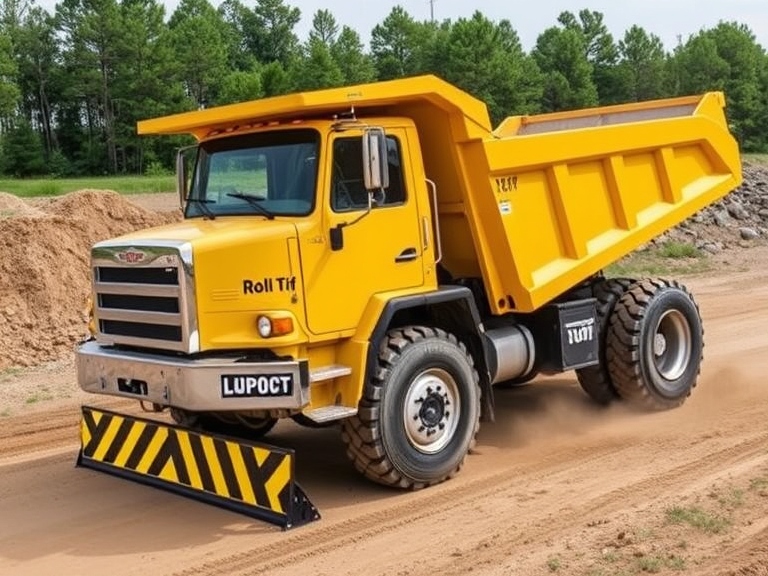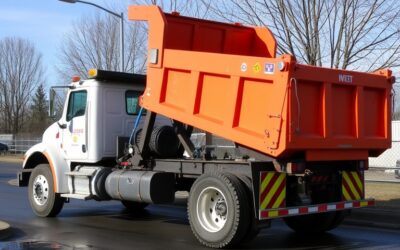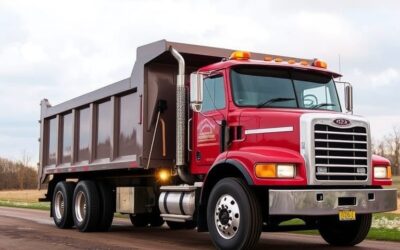Dump trucks carry heavy loads, making them prone to tipping. These accidents can cause severe injuries, costly repairs, and delays. By understanding the causes and adopting simple solutions like Wink Anti-Tip, fleet operators can keep their trucks stable and drivers safe. Dump trucks, due to their large size and heavy loads, have a higher risk of tipping over. When these trucks tip, it can lead to severe accidents, costly repairs, and even serious injuries. Understanding the best ways to prevent these tip-overs is key to protecting both the drivers and the trucks.
One of the main reasons dump trucks tip is due to improper loading and unloading practices. Uneven distribution of weight can easily cause a truck to lose its balance. Other factors like road conditions and sharp turns also contribute to the risk of tipping. By following best practices and using the right technology, these risks can be greatly reduced.
Introducing innovative technology like Wink Anti-Tip can significantly help in maintaining truck stability. This system automatically adjusts the truck’s balance to prevent tip-overs, making it an invaluable tool for fleet operators.
Understanding Common Causes of Dump Truck Tip-Overs
Dump truck tip-overs often happen because of uneven loading, poor road conditions, or sharp turns. These issues shift the truck’s center of gravity, making it unstable and increasing the risk of tipping. One of the most common causes is uneven loading. When the cargo is not distributed evenly across the truck bed, the center of gravity shifts. This imbalance can cause the truck to lean and eventually tip, especially when turning or navigating uneven roads.
Road conditions also play a critical role in truck stability. Potholes, soft shoulders, and steep slopes can make it hard for drivers to maintain control. Combined with the heavy load these trucks carry, any sudden change in terrain can trigger a tip-over.
Another major factor is driver maneuvering. Sharp turns, sudden stops, and quick starts can all destabilize a dump truck. When drivers take these actions, the load might shift abruptly, causing the truck to tilt. Understanding these common causes helps in identifying ways to prevent tip-overs and ensuring safer operations.
Best Practices for Loading and Unloading
To keep dump trucks stable, follow best practices for loading and unloading. Distribute cargo evenly from front to back and side to side to maintain balance and reduce tipping risks. Spread the load out evenly from front to back and side to side. This balanced distribution helps maintain the truck’s center of gravity, reducing the risk of tipping.
Use tools like leveling gates to ensure the load is properly placed. Always unload on level ground to avoid sudden shifts. Using tools like leveling gates can ensure the load is placed correctly. When unloading, do so on level ground whenever possible. Unloading on an incline increases the risk of the truck tipping, especially if the load shifts suddenly.
In addition to balanced loading, stick to manufacturer weight limits. Overloading makes trucks harder to control and more likely to tip. Stick to the manufacturer’s recommended weight limits. Overloading a truck makes it harder to control and more likely to tip. Regularly check the weight to make sure you are within safe limits.
By following these best practices for loading and unloading, you can significantly reduce the risk of dump truck tip-overs. These simple steps help maintain stability and ensure safer driving conditions.
Using Technology to Improve Stability
Technology like Wink Anti-Tip actively keeps dump trucks stable and safe. This system continuously monitors balance and automatically lowers the truck unit to prevent tip-overs before they occur. One of the best tools for this is Wink Anti-Tip. This advanced system continuously monitors the truck’s balance and load distribution. When it detects instability, it automatically lowers the truck unit, helping to prevent tip-overs before they occur.
Another valuable feature of Wink Anti-Tip is its real-time driver alerts. As soon as the system senses a potential tip-over, it sends an alert to the driver. This instant notification allows the driver to take corrective actions, such as slowing down or adjusting their driving path, to stabilize the truck.
Equipping dump trucks with Wink Anti-Tip can significantly reduce the risk of accidents. By providing real-time adjustments and immediate driver alerts, this technology helps keep both the truck and its driver safe. It ensures that even if something goes wrong, there is a system in place to restore balance and prevent dangerous situations.
Regular Maintenance and Inspections to Prevent Tip-Overs
Regular maintenance and inspections are crucial for preventing dump truck tip-overs. Regularly inspect brakes, tires, and suspension for wear and tear. These components are essential for maintaining stability. Any faults in these areas can contribute to instability, making regular upkeep essential.
Keep the truck bed clean and free of debris. A smooth, balanced surface helps reduce tipping risks. Ensure that it is clean and free from debris that could affect load distribution. A balanced, smooth surface helps keep the load even, reducing the risk of tipping. Look for any signs of wear and tear that might cause problems during loading and unloading.
It’s also wise to Calibrate Wink Anti-Tip’s sensors regularly to ensure accurate readings and reliable performance. Make sure the sensors and automatic adjustments are working correctly. This ensures that the technology is fully operational and ready to prevent tip-overs when needed. Regular calibration keeps the system accurate and reliable.
By conducting regular maintenance and inspections, you can address potential issues before they lead to accidents. A well-maintained truck is more stable, safer, and less likely to tip over.
Conclusion
Preventing tip-overs is essential for safer roads and more efficient operations. By following loading best practices, using advanced technology like Wink Anti-Tip, and conducting regular maintenance, fleets can stay safe and productive. By understanding the common causes of tip-overs, drivers and fleet managers can take proactive measures to maintain truck stability. Proper loading techniques, such as balancing the load and avoiding overloading, play a critical role in keeping trucks stable.
Investing in technology like Wink Anti-Tip provides an extra layer of protection by monitoring stability and making real-time adjustments. The alerts and automatic actions from this system can prevent tip-overs, ensuring both the truck and its driver remain secure on the road.
Regular maintenance and inspections further enhance truck safety. These practices help identify and fix any mechanical issues, keeping the truck in optimal operating condition. A well-maintained truck, equipped with advanced safety technology, is far less likely to experience tip-overs.
Looking for ways to prevent dump truck tip-overs? Explore Wink Anti-Tip today to learn about our anti-tipping device and keep your trucks stable and roads safe.





